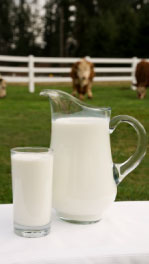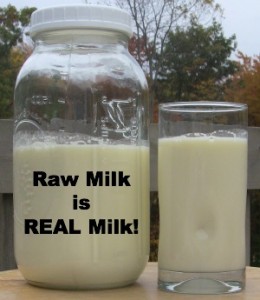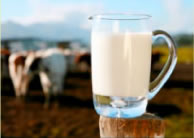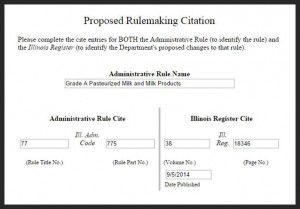UPDATE: Public Hearing Nov. 6 – See Action Alert
Proposed Regulations Published Sep. 5
 Raw milk supporters in Illinois who have been contending with IDPH since 2012 and fended off a bill to ban raw milk confirm FDA’s influence. Raw milk supporters in Illinois who have been contending with IDPH since 2012 and fended off a bill to ban raw milk confirm FDA’s influence.
Proposed Regs |
Next month, the Illinois Department of Public Health (IDPH) is scheduled to introduce in the Illinois Register proposed regulations on the production and sale of raw milk in the state–regulations that a number of Illinois raw milk producers believe could put them out of business.
The proposed regulations include the following provisions for raw milk producers:
- A producer with even just one cow or goat would be required to have a permit and would be subject to regular inspections and testing.
- Sanitary standards that can be arbitrarily applied against producers to shut them down even when there is no threat to the public health.
- Prohibiting unlicensed producers from giving milk away to guests at their farms.
- Prohibiting herdshares and the distribution of raw milk through community subscription agriculture (CSAs) unless the producer is in compliance with all requirements for Grade A dairies which produce raw milk for pasteurization—a financially impossible standard to meet for just about all shareholder and CSA dairies.
- Requiring producers to provide “instructions for the consumer to notify the local health department for the area in which the consumer resides of a consumer complaint or suspected foodborne illness or to notify the department of a complaint of farm sanitary conditions.” Are producers of any other foods required to do this?
- Requiring producers to “provide the consumer with Department approved consumer awareness information with each sale or transaction . . . .” Again, are producers of any other foods required to do this?
Currently, the unlicensed on-farm sale of raw milk is legal in the state by policy; it’s a policy that has worked well. There has not been a single foodborne illness outbreak attributed to an Illinois raw milk producer going back to at least 1998, if not much further. Raw milk supporters in the state are wondering, why IDPH is trying to “fix” something that isn’t broken? The answer is the U.S. Food and Drug Administration (FDA).
In 2012 and 2013 a dairy workgroup led by Molly Lamb, Division Chief of the IDPH Division of Food, Drugs and Dairy, met to draft regulations governing raw milk sales and production. The dairy workgroup eventually consisted of an even balance of raw milk supporters and opponents; but at the time the initial draft of the regulations were written—most of which is now part of the proposed regulations—the workgroup was almost entirely made up of those opposing raw milk.
The dairy workgroup is a subcommittee of the Food Safety Advisory Committee (FSAC) of which Lamb serves as chair. FSAC which–among other things– provides advice on food safety matters to IDPH, is not mandated by statute but is supported through an FDA Food Safety Task Force Grant. In other words, money from a federal agency–that has banned raw milk in interstate commerce and would like to see it banned in intrastate commerce–funded a workgroup to draft regulations for raw milk production and sales. Aside from funding the workgroup, FDA also has one of its own employees, Larry Trandel, on the workgroup.
Journalist Tom Kocal of the Prairie Advocate News in Lanark, Illinois wrote a series of articles on the dairy workgroup, including coverage of a workgroup meeting on May 1, 2013, that was open to the public. Kocal quotes Lamb as saying that since IDPH had adopted the federal government Food Safety Modernization Act (FSMA), the IDPH must now create rules for raw milk simply because the Act says it must. Lamb’s statement is not true. There is nothing in FSMA that requires a state to issue regulations governing raw milk. For Lamb to even make that claim shows the influence FDA (and its money—during fiscal year 2012, IDPH received over $894,000 in grants from FDA) has over the Illinois Department of Public Health. In case anyone needed to be reminded of FDA’s position on raw milk, Trandel stated at the meeting that “We [FDA] do not consider raw milk safe for human consumption. All raw milk is considered potentially adulterated.”
To summarize:
- 1. The Illinois Department of Public Health is issuing proposed regulations that will make it more difficult for raw milk producers to remain in business even though there has not been a single foodborne illness outbreak attributed to an Illinois raw milk producer going back to at least 1998.
- 2. A dairy workgroup, not mandated by the legislature but funded by an FDA grant, drafted the proposed regulations.
- 3. FDA has banned raw milk in interstate commerce and would have it banned in intrastate commerce if it had its way, believing all raw milk is “potentially adulterated.”
- 4. FDA has no jurisdiction to regulate raw milk in Illinois.
- 5. FDA has evidently convinced IDPH that the Food Safety Modernization Act requires the department to issue regulations on raw milk production and sales even though the Act does not.
Illinois law and policy on raw milk production and sales should be made in Illinois not in Washington. FDA has no business meddling in raw milk sales within the State of Illinois.
WHAT’S NEXT
Once IDPH introduces the proposed rules there will be a 45-day comment period in which supporters of raw milk and freedom of choice will have an opportunity to make their views known to IDPH.
Ask the department to withdraw the proposed regulations and let a policy that has worked well for many years remain in place. If any branch of government should be acting on this issue, it should be the state legislature passing a bill to codify the existing policy. Stop the FDA end-around on representative government in Illinois.
For updates on the proposed regulations, please check the Illinois Alliance for Raw Milk Facebook page and this website.
ACTION ALERT – ATTEND PUBLIC HEARING NOV. 6
 Photo credit: KellytheKitchenKop.com
Photo credit: KellytheKitchenKop.com
WHAT YOU CAN DO
Contact the Governor and Attend IDPH Hearing
Thursday – November 6, 2014
9 a.m. to 4 p.m.
Illinois State Fairgrounds – Illinois Building
801 Sangamon Ave. (near Gates 1 & 12)
Springfield, IL 62702 [directions]
Re: Proposed Amendments to 77 Ill. Adm. Code 775, Raw Milk
The Illinois Department of Public Health (IDPH) has falsely claimed that it must issue raw milk regulations to be in compliance with federal requirements. There is no federal requirement that any state issue regulations on raw milk for human consumption. Shortly after the hearing on November 6, the Joint Committee on Administrative Regulations (JCAR) will begin its review of the proposed regulations; this legislative committee has the power to reject them.
A big turn out for the hearing on November 6 is important in the effort to defeat the regulations. A record of the hearing will be sent to JCAR; so, the more people on record at the hearing opposing the rules means a better chance JCAR will vote them down.
Illinois Governor Patrick “Pat” Quinn also has the power to order IDPH to withdraw the proposed rules. The proposed rules undermine the governor’s efforts to promote local food and small farms. Within in the past ten years, 20% of the state’s conventional dairy farms have gone out of business. Imposing burdensome regulations on Illinois raw milk producers will cause even more dairies to shut down.
Call the Governor’s offices in Springfield (217-782-0244) and Chicago (312-814-2121); let Gov. Quinn hear from Illinois residents.
You may use the Talking Points below to craft your message for the hearing. To be most effective, please follow up any correspondence with a phone call.
Click here to review the proposed regulations
Talking Points
Tell IDPH why raw milk matters in Illiois
Let officials know how consuming raw milk obtained from raw milk producers has benefited your health and the health of your family.
Talk about the public health impacts:
- If it’s not broken, don’t fix it. The proposed regulations are a solution in search of a problem. There have been no cases of foodborne illness outbreaks attributed to Illinois raw milk producers going at least as far back as 1998 if not further back. The state policy of allowing unlicensed on-farm sales of raw milk has been in existence for over thirty years and has worked well.
- Clear lines of traceability are inherent in direct sales of raw milk from the farm to consumers–a component of any sound public health system.
Raw milk producers typically are small farms having only a few animals or small herds and are able to provide the kind of attention that is needed to make sure every animal is healthy and the milk is produced and sold in a sanitary manner compared to larger pasteurized dairy operations that have hundreds and hundreds of cows’ milk combined together creating a situation where the same care and attention is not possible. - There is no federal requirement that any state issue regulations on raw milk for human consumption. IDPH has falsely claimed that it must issue regulations to be in compliance with federal requirements; instead, IDPH should be directed to focus on real public health issues in the industrial food system.
- This is a freedom of choice issue. If consumers want to buy raw milk from an unlicensed producer, that should be their prerogative. IDPH doesn’t need to be protecting consumers from themselves, especially with the Illinois producers’ strong track record for safety.
Talk about the economic impacts:
- The regulations will hurt the local economy. A number of Illinois raw milk producers have indicated that if the regulations go into effect, they will either quit the dairy business or go underground and continue to sell without the license required by the regulations. The net effect will be that access to locally produced raw milk will not be as great, causing consumers to spend more of their food dollars on out-of-state sources.
- Rules meant for large-scale, multi-farm dairy operations are being proposed for small family farms that sell small quantities direct to the final consumers, while also prohibiting those farms from selling raw milk anywhere but the farm. Complying with the requirements will be cost prohibitive for many.
- As environmentally-conscious stewards of the land, family farmers that produce raw milk are predominantly diversified farms focused on sustainability and providing local food for their communities. Many depend on the income from raw milk to supplement their other farming income streams.
- The proposed rules are a job killer at a time when Illinois, especially rural Illinois, and family farmers are already struggling economically.
- The proposed rules undermine the governor’s efforts to promote local food and small farms. Within in the past ten years, 20% of the state’s conventional dairy farms have gone out of business. Imposing burdensome regulations on Illinois raw milk producers will cause even more dairies to shut down.
ACTION ALERT – PROPOSED REGULATIONS
Tell IDPH to Withdraw Proposed Rule
Stop Illinois Department of Health from Adopting Any Raw Milk Regulations
WHAT YOU CAN DO
For over 30 years, the unlicensed on-farm sale of raw milk has been legal by policy in Illinois. It’s a policy that has worked well with no reports of foodborne illness attributed to Illinois raw milk producers going at least as far back as 1998, if not further back.
The Illinois Department of Health (IDPH) issued proposed regulations on September 5th that a number of raw milk producers believe would put them out of business. The proposed regulations contain sanitary standards that can be arbitrarily applied against producers, provide requirements intruding on the farmer-consumer relationship, and prohibit distribution of raw milk through herdshares and CSAs unless the dairies are in compliance with all requirements for Grade A dairies–a financially impossible standard for small family farms to meet. The proposed rules even prohibit unlicensed dairy farmers from giving raw milk to guests at their homes.
An official with IDPH has admitted that the regulations the department wants to become law would not be passed by the Illinois Legislature if submitted as a bill. If it won’t pass through the people’s branch of government, why should the agency adopt it as law?
IMPORTANT DEADLINES (see action steps below):
Thursday, Sep. 18: Request a hearing on the proposed regulations
Monday, Oct. 20: Submit comments to IDPH
Please pass this action alert on and ask others to do the same.
ACTION #1 – REQUEST A HEARING
Ask IDPH to hold a hearing on the proposed rule, “Grade A Pasteurized Milk and Milk Products” (77 Ill. Adm. Code 775); see Talking Points below.
If, by September 18, twenty-five (25) individuals request a hearing, IDPH by law must hold one. The email address is [email protected]
Submit comments to IDPH and request that it withdraw the rule. In the email also request that the department hold a hearing on the rule; see Talking Points below.
When using the online form to Submit Comments, here’s what to type in the fields (see example):
Proposed Rule: Grade A Pasteurized Milk and Milk Products
Rule Title Number: 77
Rule Part Number: 775
Volume Number: 38
Page Number: 18346
Date Published: 9/5/2014
online comment form –
http://app.idph.state.il.us/legal/rulesform.asp
ACTION #3 – CONTACT JCAR
Call or email members of the Joint Committee on Administrative Regulations (JCAR). JCAR is a legislative body that has the power to reject proposed rules, after the initial 45-day comment period. JCAR will have the proposed rules before it for review in a second 45-day comment period. Now is an opportunity to let the committee know in advance why it should reject the rules if IDPH does not withdraw them.
See pointers for Writing Letters to Legislators below.
See list of JCAR members below.
To send an email to all JCAR members, please copy and paste the below email addresses into the “to” field of your email:
- [email protected], [email protected], [email protected], [email protected], [email protected], [email protected], [email protected], [email protected], [email protected], [email protected], [email protected], [email protected]
- If it’s not broken, don’t fix it. The proposed regulations are a solution in search of a problem. There have been no cases of foodborne illness outbreaks attributed to Illinois raw milk producers going at least as far back as 1998 if not further back. The state policy of allowing unlicensed on-farm sales of raw milk has been in existence for over thirty years and has worked well.
- The regulations will hurt the local economy. A number of Illinois raw milk producers have indicated that if the regulations go into effect, they will either quit the dairy business or go underground and continue to sell without the license required by the regulations. The net effect will be that access to locally produced raw milk will not be as great, causing consumers to spend more of their food dollars on out-of-state sources.
- This is a freedom of choice issue. If consumers want to buy raw milk from an unlicensed producer, that should be their prerogative. IDPH doesn’t need to be protecting consumers from themselves, especially with the Illinois producers’ strong track record for safety.
- Tell IDPH that raw milk matters. Let IDPH know how consuming raw milk obtained from raw milk producers has benefited your health and the health of your family.
Additional Talking Points for JCAR only:
- Illinois law and policy on raw milk production and sales should be made in Springfield not Washington. FDA, the most anti-raw milk agency in the country, funded the dairy workgroup that drafted the proposed rules; an FDA official was on that workgroup and stated that FDA considers all raw milk potentially adulterated.
- The proposed rules would place regulation with an agency that was complicit in an attempt to ban raw milk in the state legislature earlier this year. In March, a consortium of county health departments tacked on an amendment to ban raw milk sales in a bogus bill to amend the Access to Restrooms Act (i.e., changing “the” to “the”). IDPH knew of the effort but and was complicit in its silence by not trying to stop the county health departments when it had the chance to do so. This happened just a few months after raw milk producers and consumers worked in good faith with IDPH to draft reasonable regulations governing raw milk sales and production in Illinois.
MORE INFORMATION
The Dairy Group Committee, a subcommittee of the Food Safety Advisory Committee (FSAC), drafted the proposed rules. FSAC, which provides advice on food safety matters to IDPH, is not mandated by statute but is supported through a grant by FDA, the most anti-raw milk government agency in the U.S. For a time, raw milk producers and consumers were on the subcommittee but raw milk proponents were only on the committee to give the appearance that there was a consensus on the drafted rules. IDPH officials and people from the dairy industry controlled the subcommittee and ignored all recommendations for the rules submitted by the raw milk producers and consumers.
The proposed rules actually contain a statement by IDPH denigrating the product it is supposed to be objectively regulating; a statement that has nothing to do with any actual requirements in the proposed regulations.
IDPH’s propaganda missive reads:
- The consumption of raw milk increases the risk of foodborne illness because the milk may contain harmful organisms (bacteria, parasites, etc.). Clinical and epidemiological studies have established a direct association between gastrointestinal illness and the consumption of raw milk. Proper pasteurization of raw milk is the only proven, reliable method to decrease the amount of harmful organisms to levels safe for human consumption.
Outside of this gratuitous shot that has no place in any law, the proposed regulations also include the following provisions for raw milk producers:
- A producer with even just one cow or goat would be required to have a permit and would be subject to regular inspections and testing.
- Prohibiting unlicensed producers from giving away milk to guests at their farms.
- Prohibiting herdshares and the distribution of raw milk through community subscription agriculture (CSAs) unless the producer is in compliance with all requirements for Grade A dairies which produce raw milk for pasteurization—a financially impossible standard to meet for just about all shareholder and CSA dairies. Even if a dairy could afford to meet the Grade A standards, it could still only distribute to shareholders and CSA members on the farm. IDPH has issued the herdshare regulation despite Illinois statute recognizing the legality of dairy livestock boarding agreements.
- Subjecting to zoning restrictions those farms that distribute raw milk to shareholders and CSA members at a farm that is “within an incorporated area of a municipality, within 1.5 miles of an incorporated municipality, or within an unincorporated urban area.” What this has to do with protecting the public health is anyone’s guess.
- Prohibiting shareholders and CSA members from paying farmers at refrigerators containing raw milk. Refrigerators would be included in the definition of “receiving stations” and, under the proposed rules, monetary transactions are prohibited at receiving stations.
- A number of sanitary standards in the regulation can be arbitrarily applied against producers to shut them down when there is no threat to public health; for example: “the flanks, udders, bellies and tail of all lactating dairy animals shall be free from visible dirt.” and “all milking equipment shall be stored in a dust-tight room…”
- IDPH is intruding into the farmer-consumer relationship by requiring farmers to maintain records of each transaction with the customer name and address, to issue “Department approved consumer awareness information with each sale or transaction”, and to provide “instructions for the consumer to notify the local health department for the area in which the consumer resides of a consumer complaint or suspected foodborne illness.” Are producers of any other foods required to do all this?
On October 20, the first 45-day notice period ends and the Joint Committee on Administrative Review (JCAR) will begin its review of the proposed regulations.
Stay tuned for future alerts. For updates, please check the Illinois Alliance for Raw Milk facebook page and this webpage.
Read FDA Driving Illinois Raw Milk Regulations
RESOURCES (click arrows below to expand sections)
JCAR MEMBERS
Email Executive Director Vicki Thomas at [email protected] or call 217-785-2254.
*CO-CHAIRMAN
SENATOR DON HARMON (D-39)
[email protected]
708-848-2002 or 217-782-8176
*CO-CHAIRMAN
REPRESENTATIVE TIMOTHY L. SCHMITZ (R-49)
[email protected]
630-845-9590 or 217-782-5457
SENATOR PAMELA ALTHOFF (R-32)
[email protected]
815-455-6330 or 217-782-8000
SENATOR TONY MUNOZ (D-1)
[email protected]
773-869-9050 or 217-782-9415
SENATOR SUE REZIN (R-38)
[email protected]
815-220-8720 or 217-782-3840
SENATOR DALE A. RIGHTER (R-55)
[email protected]
217-235-6033 or 217-782-6674
SENATOR IRA SILVERSTEIN (D-8)
[email protected]
773-743-5015 or 217-782-5500
REPRESENTATIVE GREGORY HARRIS (D-13)
[email protected]
773-348-3434 or 217-782-3835
FAX 773-348-3475 or 217-557-6470
REPRESENTATIVE LOUIS I. LANG (D-16)
[email protected]
847-673-1131 or 217-782-1252
REPRESENTATIVE DAVID L. LEITCH (R-73)
[email protected]
217-782-8108 or 309-690-7373
REPRESENTATIVE DONALD L. MOFFITT (R-74)
[email protected]
217-782-8032 or 309-343-8000
REPRESENTATIVE ANDRE THAPEDI (D-32)
[email protected]
773-873-4444 or 217-782-1702
Last updated 9/16/2014
WRITING LETTERS TO LEGISLATORS
Writing a Letter to Your Legislator
In order to write a letter that will have an impact on your legislator:
- Use your own words. Legislators don’t pay attention to form letters.
- Identify yourself. Let him/her know you are one of his/her constituents.
- Be brief. Keep it to one page.
- Be specific. Give detailed background information.
- Be logical. Support your arguments and do not just use emotions.
Please do NOT include farmer or farm names in order to protect farmer identities.
SUGGESTED COMPOSITION:
1st Paragraph: Introduce yourself and state your purpose (that you do not support regulations on raw milk), and specifically mention what you are concerned about [Grade A Pasteurized Milk and Milk Products (77 Ill. Adm. Code 775), Published 9/5/2014. Illinois Register Citation 38 Ill. Reg. 18346]. Specifically state this info so the legislator/agency can refer to what you are informing them.
2nd Paragraph: Explain why you do not support the regulations.
Examples may include [also see Talking Points ]:
- the regulations hinder peoples’ ability to consume raw milk and infringes on their right to choose what they can or cannot eat
- the regulations are detrimental to Illinois farmers and the economy as they would put raw milk producers out of business due to costs associated with meeting restrictions and gaining a Grade A permit. Raw milk would be sold on the black market via coming in from out of state.
- personal health benefits
- the regulations address a safety issue that does not exist
3rd Paragraph: Explain how it affects you, your community, and/or state through stories/examples (may refer to bullet points above)
4th Paragraph:
- State what you would like the legislator/agency to do (a call to action) and ask for follow up
- When writing to a legislator, you may ask him/her to be willing to sponsor a bill to repeal the regulations if enacted or to vote against raw milk regulations
- Urge your personal legislators to contact members of JCAR and tell them to reject IDPH’s raw milk regulations
- Urge JCAR members to reject the regulations
- Request a hearing for the raw milk regulations (if nothing else make sure you do this one!)
5th Paragraph: Thank the legislator for his/her time.
Sign off: Sincerely,
Last updated 9/16/2014
Last updated 9/16/2014

